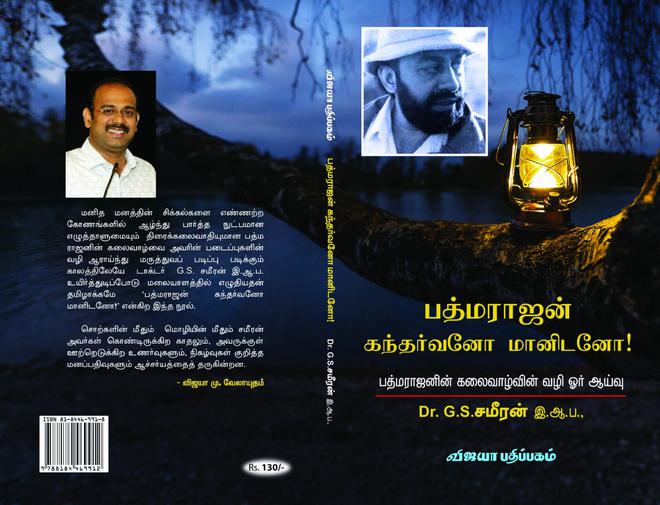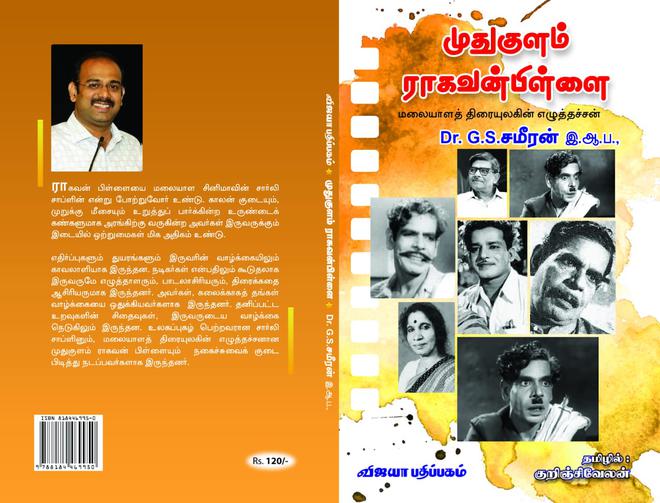Malayalam film Oridathoru Phayalvaan, a cult classic, narrated the story of a small town wrestler’s rise to glory and subsequent fall, winning awards at many international film festivals. It was written and directed by P Padmarajan, known for his contributions to Malayalam literature and cinema.
Coimbatore District Collector Dr GS Sameeran, IAS discusses Padmarajan’s films and literary works in his Malayalam book that has now been translated into Tamil as Padmarajan Gandharvano Manithano. It was recently released at the ongoing Coimbatore Book Festival.
Padmarajan’s first directorial Peruvazhiyambalam that came out in 1979 based on his novel by the same name romanticised a certain kind of masculinity that and how people dread and adore at the same time. In Kallan Pavithran, that tells the tale of a petty thief (played by Nedumudi Venu) and his life-changing episode of theft, Padmarajan compels the audience to redefine the word, ‘thief’. “I draw a comparison to Satyajit Ray’s The Apu trilogy and connect the common thread running along these three films,” says Sameeran, who has also authored a biography on Muthukulam Raghavan Pillai, a poet and writer who wrote the songs, screenplay and story of Balan, the first talkie film in Malayalam that had 26 songs. The book has now been released in Tamil as Muthukulam Raghavan Pillai.
“Both are from Muthukulam village in Alleppey district. As I also hail from the same village, I was naturally drawn towards their work. I wrote the book on Padmarajan in 2006 when I was still a medical student in Thiruvananthapuram. It’s more of an expression of protest where I address that while his films were celebrated, his literary persona got overshadowed. Though he excelled in both, he’s more of a writer and an accidental filmmaker.”

Some of Padmarajan’s later films, especially Thoovanthumbikal, Namakku Paarkaan Munthiri Thopugal, Innale and Koodevide became so popular that his literary contributions went unnoticed, says the author, adding that the filmmaker was one of the youngest writers to have won the Sahitya Akademi Sahitya AcademyAward for his novel Nakshathrangale Kaaval.
“I pored over his short stories, novels and novellas and watched all his films. My research was complete. I address the dynamics between the writer and the filmmaker, his rural and urban stories, his men and women. I have also provided an in-depth take on his characters, the context, and their background.”
Sameeran also interacted with the filmmaker’s family members. “I analysed his work from the perspective of how Muthukulam inspired him. I tried to throw light on his portrayal of women, men and their conflicts. I could relate to the characters in his films, as most of his iconic characters like Thakara (played by Prathan Pothen), Sivanpillai maesthri and Chellappan aasari are living characters in my village. I have interviewed and interacted with them during the course of writing the bookMany PhD students have referred my book for their thesis on Padmarajan.”
Sameeran’s second book, a biography of Muthukulam Raghavan Pillai, published in 2013 throws light on one of the first comedians of Malayalam cinema. “He came in much before Adoor Bhasi and acted in more than 70 films and wrote over 50 screenplays, including films and drama. He was a literary figure, great comedian and actor who died in an unfortunate situation in Kodambakkam with no one by his side. I attended a commemorative lecture on Raghavan Pillai and that was the starting point to writing the book. His contributions are immense in films and literature.”

The biography that is partly fictional highlights his contributions to bringing new age drama to Malayalam. “He introduced real characters in drama. He also wrote political dramas in the late 1920s and 1930s. He was a revolutionary and some of his works were banned in Travancore. Many are unaware of this part of history and identify him nobody knows. Everybody identifies himself as a comedian.”
Talking about the Tamil translation, Sameeran says M Velayutham, founder of Vijaya Publications, offered to translate his books in Tamil after listening to his speech about Muthukulam at an event. “I spoke of my days at vayanasala (public library) that was run by a librarian who earned his living as a hairdresser, my village, and my two books.”
“The books give a peek into history,” says Velayutham. While Tamil scholar M Subramani has translated his book on Padmarajan, Kurunji Velan who runs the quarterly magazine Thisai Ettum has worked on the second book. “Everyone associates films with Kodambakkam, but we should also know about the history of other States. For youngsters today, film making is so easy with digital cameras and animation. They should know how it all started, may be with Balan, the first Malayalam talkie made by Salem’s Modern Theatres.”







